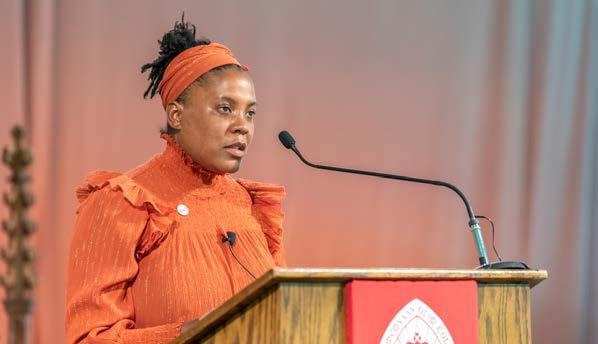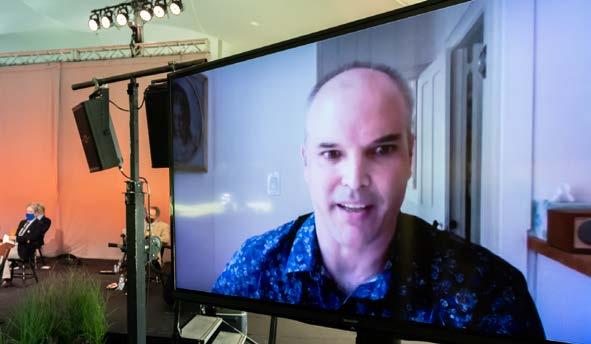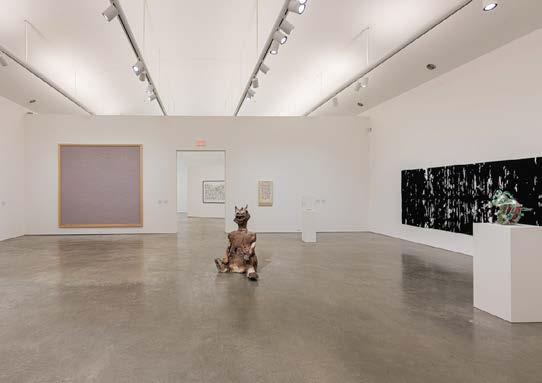
7 minute read
160th Commencement
COMMENCEMENT 2020
160th Commencement
by James Rodewald ’82
Bard’s 160th Commencement was initially postponed from May 23 and ultimately reimagined to accommodate the restrictions and complications of public gatherings in a COVID-19 world. Despite the pandemic, the 437 undergraduate and 161 graduate students who received degrees on August 22—in absentia, of course—were celebrated wholeheartedly and honored not only for their academic achievements but also for their remarkable resilience and perseverance. “I have never been prouder of a graduating class than I am of this class of 2020,” President Leon Botstein began his livestreamed charge.
The global pandemic, economic collapse, laying bare of systemic racism, obscene wealth inequality, and the damage being inflicted by climate change and environmental neglect have “eroded public confidence in democracy, . . . fueled a sense of powerlessness, and whetted a popular appetite for autocracy and tyranny,” Botstein said. But these societal ills also provide the backdrop for optimism and opportunity. “We have a chance to create good government,” he continued, highlighting a need that has never before been so obvious. “[Graduates of the class of 2020] have the skills of inquiry, curiosity, criticism, and improvisation—hallmarks of liberal learning—that the economy and politics of this century demand.”
The privilege of such an education brings with it the responsibility to be “vigilant in seeing to it that, after the nightmare of our current government is over, we give our fellow citizens the public elementary and secondary education a true democracy deserves,” said Botstein. “Only with a system of education that is both equitable and excellent can the promise of freedom and the rights of democracy and an open society be realized for all.”
As difficult, disruptive, and at times frustrating as the shift to remote learning was for students and teachers, it made abundantly clear the limitations of technology. “True learning and intellectual and artistic progress have been made and will continue to be made in a community of scholars, scientists, students, and artists, in person and in groups, without masks, without isolation and social distance,” said Botstein. “Without a balance between the individual and the social and the ability to see the smiles of others, freedom and justice will not flourish.”
Musician, author, and visual artist David Byrne joined Botstein, at a distance, in the graduation tent in Annandale. His remarks, broadcast for all to see and hear (and archived at bard.edu/commencement), were a window into his wide-ranging brain. Like Botstein, Byrne focused on the opportunity presented by the moment. He echoed a refrain in “Once in a Lifetime,” one of his best-known songs, when he said “same as it ever was,” but clarified that, in fact, the constant is change. “The pandemic has pulled back the curtain, which has revealed both the worst and the best of what and who we are,” he said. “Arundhati Roy referred to this moment as a portal when we have unprecedented opportunity to change things, to cross into another world. In this moment, we have been both cursed and blessed. . . . An era based on a set of biases and assumptions is ending. In a sense, we’re lucky. The portal that she mentions is opened and we have a chance to go through it.”
Byrne reminded us that what we now take as given was not always so. He illustrated his point that “the changes that have happened . . . they’re here because we made them so” with examples from history, including slavery, women’s suffrage, education as a right, interracial marriage, gay marriage, clean air, and clean water. “These changes weren’t predictable,” he said. “And they weren’t inevitable. People make these changes. Things that seemed impossible have happened, and they will continue to happen. There’s no guarantee that change will be good. That part is up to us.”

HONORARY DEGREES
Byrne and musician and performer Laurie Anderson received Doctor of Fine Arts degrees; Steven Chu, physicist and advocate for renewable energy, was awarded a Doctor of Science degree; Doctor of Humane Letters degrees went to Thelma Golden, director and chief curator of the Studio Museum in Harlem, Linda E. Johnson, president and CEO of the Brooklyn Public Library, and Ellen Condliffe Lagemann, a nationally recognized expert in education research; and biophysicist George D. Rose ’63 received a Doctor of Science Alumni/ae Honorary Degree.
AROUND THE GLOBE
Campuses throughout the Bard network also awarded degrees to members of the class of 2020, including Bachelor of Arts and Master of Arts in Teaching at Al-Quds University in East Jerusalem on October 14; Bachelor of Arts and Master of Arts in Teaching at American University of Central Asia in Bishkek, Kyrgyzstan, on May 30; Associate in Arts and Bachelor of Arts at Bard College at Simon’s Rock: The Early College in Great Barrington, Massachusetts, on May 16; Bachelor of Arts at Bard College Berlin: A Liberal Arts University in Berlin, Germany, on May 16; Associate in Arts at Bard Early College New Orleans on May 27, Bard High School Early College Baltimore on June 11, Bard High School Early College Cleveland on June 19, Bard High School Early College Manhattan on June 24, Bard High School Early College Newark on June 18, Bard High School Early College Queens on June 25; Associate in Arts to students at Bard Prison Initiatives in Coxsackie, Eastern NY, Fishkill, Green Haven, Taconic, and Woodbourne Correctional Facilities on June 6 in Woodbourne, New York; Bachelor of Arts and Master of Arts at Faculty of Liberal Arts and Sciences (Smolny), St. Petersburg State University in St. Petersburg, Russia, on June 30; Master of Music at Longy School of Music of Bard College in Cambridge, Massachusetts, on May 9; and Master of Arts in Teaching at Longy School of Music of Bard College in Los Angeles on June 19.
Bard College Awards Ceremony
Barbara S. Grossman ’73, longtime editor and book publisher who, as an undergraduate, won the John Bard Scholarship, Wilton Moore Lockwood Prize for creative writing, and William J. Lockwood Prize, and went on to become vice president and publisher at Viking Penguin, received the Bard Medal; University of California, Riverside, assistant professor Juliet Morrison ’03, a microbiologist studying ways to target viral infections, was awarded the John and Samuel Bard Award in Medicine and Science; Interdisciplinary artist Xaviera Simmons ’05, whose work is rooted in shifting definitions of landscape, character development, art, and political and social histories, was honored with the Charles Flint Kellogg Award in Arts and Letters; Nicholas Ascienzo, math teacher, softball and baseball coach, and founder of the Ascienzo Family Foundation, which focuses on poverty alleviation, educational opportunities for the underserved, and services for senior citizens, was given a John Dewey Award for Distinguished Public Service; Journalist Matthew Taibbi ’92, a contributing editor at Rolling Stone who has reported on politics, media, finance, and sports, and published books on subjects as wide-ranging as the killing of Eric Garner by New York City police, the rise of Trump and populism, and, most recently, the disturbing reality of today’s news media, also was awarded a John Dewey Award for Distinguished Public Service; Carolyn Forche, poet, activist, translator, professor, and one of the most important voices in contemporary literature, won the Mary McCarthy Award, given in recognition of engagement in the public sphere by an intellectual, artist, or writer; Bardian Awards went to Peggy Ahwesh, professor of film and electronic arts, whose work has been shown at the Museum of Modern Art and Whitney Museum of American Art in New York, Los Angeles Contemporary Exhibitions, Institute of Contemporary Arts in London, and Centre Pompidou in Paris; Physics Professor Matthew Deady, who inspired decades of science majors and those nonscience students lucky enough to have taken courses with him; Bonnie R. Marcus ’71, Bard’s first female student body president and later senior associate director in the Office of Admission; and Richard Teitelbaum, a pioneer in the composition and performance of electronic music and cofounder of the groundbreaking live electronic music group Musica Elettronica Viva, who died in April.
1

Barbara S. Grossman ’73

University of California, Riverside, assistant professor Juliet Morrison ’03

Interdisciplinary artist Xaviera Simmons ’05

Nicholas Ascienzo

Journalist Matthew Taibbi ’92

Carolyn Forche

Peggy Ahwesh

Physics Professor Matthew Deady

Bonnie R. Marcus ’71








